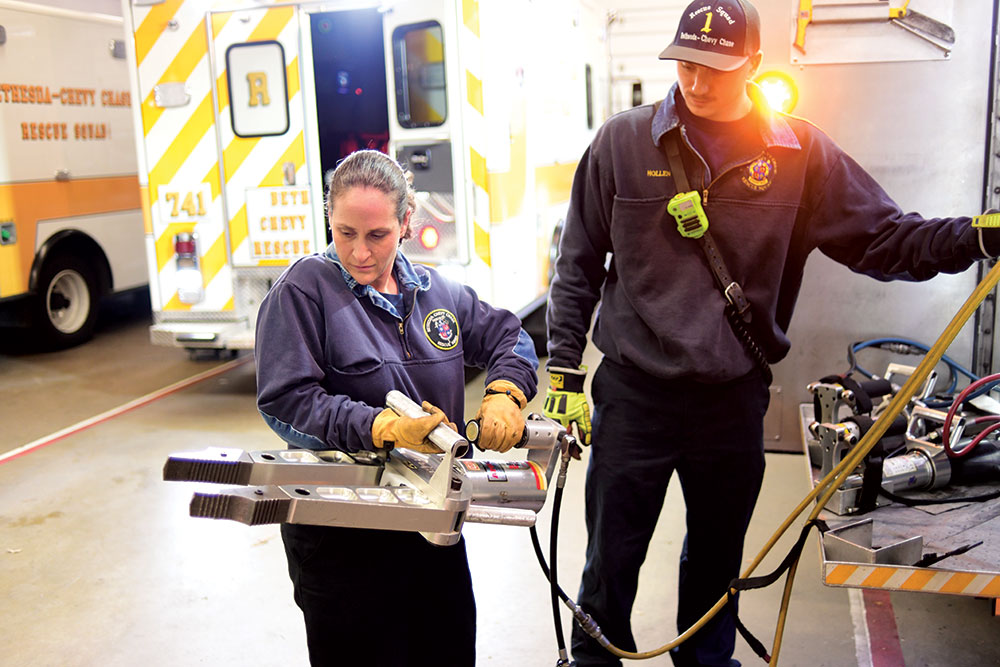
The details came blaring through her radio headset: two-alarm house fire in Potomac. Backup needed. Search and rescue required. Not immediately known if anyone is trapped inside.
With her ponytail tucked inside her canvas overcoat, Emily Rogell, the mother of toddler twins, sat in the back of the speeding fire truck and noticed the firefighter next to her make the sign of the cross, something she’d never seen a colleague do before. We might not return from this fire alive, she thought.
The petite Rogell was the only female on the truck for that midday call to the Avenel neighborhood in the spring of 2012. She’d just returned to her volunteer position with the Bethesda-Chevy Chase Rescue Squad, and her firefighter gear fit differently than it had before she left to have her babies. The twins were home with her husband, Don Greene, a fellow firefighter. The two met at the rescue squad in 1999 and stayed together when Rogell moved away for veterinary school. After having Abby and Isaac, they decided not to ride together anymore because they couldn’t risk orphaning their children. In the front of the fire truck that day sat a man who attended their wedding.
In the burning house, Rogell moved from room to room on her belly and knees, sweat dripping into her eyes, thick black smoke in the air. Firefighters have to go through every foot of the house in teams of two to ensure that no one is trapped or unconscious. They cringe at the open floor plans that are common in newer houses—it’s harder to check the perimeter and center of each room.

Rogell passed through a doorway and spotted the teddy bears and patterned bedspread of a little girl’s room. The toys and stuffed animals were eerily similar to some of the baby gifts she’d received for Abby. But she didn’t see a little girl. She and her partner crawled to each corner of the room to make sure it was empty. They’d learn later that nobody was home when the fire broke out.
As the water began to flow from hoses, Rogell tore down hunks of ceiling and drywall in search of hot spots, hidden areas where the fire could still smolder. She later climbed onto the ladder truck to pull shingles off the roof to ventilate the house and prevent a rekindling. In the truck on the way back to Bethesda, the smell of smoke lingered. It’s an odor that firefighters learn to like, or at least get used to having on their skin and hair. At the station, a second call came in: The fire wasn’t completely out and backup was needed. Rogell, soaked in sweat, returned to the scene and pulled down more ceiling. Her shift was supposed to have ended long ago, but being a volunteer firefighter means staying until the call is done, no matter how long it takes.

At home that night, Rogell picked up each of her sleeping babies for a long hug, not caring if she woke them, taking in their smokeless scent with the teddy bears still fresh in her mind. In the 13 years she’d volunteered as a firefighter, she’d asked the question only a handful of times, and only since becoming a mom. That night, it went through her head again: Why do I do this?
The number of women serving as volunteer EMTs and firefighters for the Montgomery County Fire & Rescue Service is growing rapidly. Of the 2,700 combined career and volunteer personnel with MCFRS, Public Information Officer Pete Piringer estimates that 20 percent are female, and women make up a slightly higher percentage of volunteers. At the B-CC station, Chief Ned Shurburne estimates that nearly 30 percent of the 150 professionally trained volunteers are female, and in the last two years, close to half of the new members who joined the squad were women.
Like Rogell, a veterinarian, many women volunteer while earning paychecks elsewhere and taking care of kids at home. It’s a demanding, high-intensity commitment that comes with a set schedule and often involves overnight shifts. “The kids are kind of part of the reason [moms] feel such an anchor to the community,” says Brenda Mannix, 50, the mother of three and a six-year volunteer at the Rockville Volunteer Fire Department. “You have kids in the schools, you use the local parks, you are part of the moms’ groups. So you want to give back.”
Mannix and others at Rockville’s Station 3 put out a call for volunteers four times a year. They typically get 45 to 60 applications per quarter and accept between 15 and 20 volunteers, roughly a third of whom are women. There’s a wide range of ages: Applicants can be as young as 16, and many women volunteer well into their 50s. “We look for people who are going to be here [at least] two to three years,” says Mannix, who lives in Rockville and chairs the department’s membership committee.
The county covers the cost of volunteer training, which can be several thousand dollars, depending on the level. Most volunteers take a 200-hour EMT course, during which they spend 14 hours a week riding on ambulances to receive their certification; others are trained as paramedics, ambulance drivers or firefighters. Once certified, volunteers are expected to be on duty 60 to 80 hours a month, which usually includes at least one 12-hour overnight shift a week.



